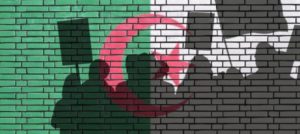Algeria’s ruling National Liberation Front (FLN) party has elected Mohamed Djemai, a 50-year-old businessman, as its new leader, state television said on Tuesday. The appointment came almost a month after mass protests forced the resignation of President Abdelaziz Bouteflika after 20 years in power. Protests have continued with demands for the dismantling of the entire ruling elite and a shift towards more democracy in Algeria, Reuters reports.
As Algeria’s uncertain transition continues, civil society groups are some of the most organized, internationally well networked, and cohesive. The questions they raise continue to structure debate online and in the street in today’s climate of revolution, making them important actors to watch in the coming weeks and months, notes Jessica Mecellem, visiting assistant professor of politics at the University of the South, Sewanee.

POMED
Their agenda is essentially in support of the rule of law. If they are successful, the new Algerian government will be more democratically robust for facilitating access to justice, tackling issues of professionalization in the security forces, and for equal distribution of the benefits of Algerian citizenship, she writes for the Post’s Monkey Cage blog:
Organizations run by relatives of victims are important agents in processes of transition to peace or democracy and, according to comparative accounts, are key links in global networks for justice. Not only are these groups some of the most practiced protesters in Algeria, they also have been working in networks of civil society organizations for decades and confronting head-on the government’s policies regarding impunity for the violence of the 1990s.
 Recently, Dalia Ghanem, a resident scholar at the Carnegie Middle East Center in Beirut, was in Algeria during the uprising against a fifth term for Bouteflika, and in early March she described the situation there in a Diwan interview. In mid-April she sat with Diwan again (above) to explain why Algerians were continuing to protest despite Bouteflika’s departure, to look forward at the presidential election scheduled for July 4, and to examine the role of the military in the country’s political transition. RTWT
Recently, Dalia Ghanem, a resident scholar at the Carnegie Middle East Center in Beirut, was in Algeria during the uprising against a fifth term for Bouteflika, and in early March she described the situation there in a Diwan interview. In mid-April she sat with Diwan again (above) to explain why Algerians were continuing to protest despite Bouteflika’s departure, to look forward at the presidential election scheduled for July 4, and to examine the role of the military in the country’s political transition. RTWT







